Do you have a paper theology or a people theology?
I used to have a paper theology.
In many ways, I suppose I still do.

A paper theology is when we have the “right” answers to tough theological questions and issues, but we don’t really know any people that are affected by our “right” answer.
In other words, paper theology is when we approach Scripture and theology from an “ivory tower” perspective. We study for the sake of studying and finding answers, but none of our answers have any real connection to life.
Paper theology is a theology that comes from studying books.
There is nothing exactly wrong with a paper theology. It is just that since paper theology never takes people into consideration, paper theology is often wrong when applied to real life. Paper theology may be right on paper, but wrong in life.
That’s because life requires people theology.
I am working on my people theology
If paper theology comes from studying books, people theology comes from being with people.
It requires coming down out of the ivory tower, leaving the quiet study, closing the dusty books, and entering into the real lives of real people who have real problems. When you do this, you quickly discover that the neat and tidy answers from your paper theology rarely applies or helps anyone in real life.
More often than not, when you get involved in the lives of people, you will find that your paper theology begins to get a bit muddled. Lines start getting erased. Clear-cut answers start to get smudged a bit.
Being with people changes your paper theology.
If you try to hold on to your paper theology when hanging around with people, it will not be long before people stop hanging around you.
The theology that looks good on paper rarely looks good when applied to people.
Jesus had People Theology
One of the biggest battles Jesus faced during His earthly minister was with the religious people of His day. While those who were labeled as “sinners” by the religious people loved to hang out with Jesus, those who were religious often found themselves at odds with Jesus.
Why?
Because the people theology of Jesus clashed with the paper theology of the religious.
Almost every single encounter Jesus had with the religious people was because they had theologically “correct” answers to pressing cultural and religious issues, but which Jesus soundly rejected in favor of loving and helping people.
The religious people had laws (easily defended from Scripture) about not working on the Sabbath. Jesus let his disciples break these laws because they were hungry (Luke 6:1-5).
The religious people had laws (easily defended from Scripture) about who could and could not be helped on the Sabbath. It was even a nice three-point answer! But Jesus ignored their neat and tidy theological answer so He could help a person get his hand back (Luke 6:6-11).
The religious people had laws (easily defended from Scripture) about stoning those caught in adultery. But when they brought an adulterous woman to Jesus, He forgave her and let her go.
We could give example after example after example.
But here’s the point: Jesus knew that the point of theology was to help us love people better.
If our theology causes us to bind heavy burdens on people’s backs, while creating rules, restrictions, and regulations for how to live life with God and others, and we stifle people’s joy, censor their love, and chide them for their grace, it is no wonder that people reject us and our theology, and maybe the God we claim to follow as well.

But let us follow the example of Jesus in developing our theology surrounded by people.
If our theology is really “true” it will lead us to look like Jesus and love like Jesus. True theology will be a theology built not on a love for paper, but on a love for people.
What does this mean for our theology?
It means that while we can develop and build our theology by reading and studying, nothing should be really set in stone until we put this theology into practice in the lives of people around us.
Do you believe God is angry about sin? Take a look at what this sort of idea does psychologically, emotionally, and spiritually to those in your life who know they are sinners. Does it lead them toward God, or away from Him? Does it lead toward honesty and openness about our failures, or does it cause us to hide and lie about our mistakes?
Do you believe that LGBTQ people are sex-crazed perverts being used by the devil to lead our country to hell? Well, first, good luck trying to prove this from Scripture, but second, how about you go out and become friends with someone who is gay? Of course, you better not tell them your theology, or you will never become friends. But if you truly become friends, you might discover that your “theology” about LGBTQ people changes. Here are some accounts of people who had this very thing happen to them:
- A pastor who changed his thinking about homosexuality
- 3 Mistakes about the Homosexual conversations and how we can correct these
Do you believe that Muslims are all violent extremists who want to chop your head off? Again, good luck trying to prove this from Scripture, but before you go spouting off about this idea to others, maybe you should go out and become good friends with some Muslims. Not to convert them or “win them to Christ,” but just to be friends with them. I think that if you do, your paper theology about Muslims might change.
We could on and on about various other theological and practical issues, but the end of the matter is this: If you get to know people as part of developing your theology, these people will change your theology more than your theology will change people. And that’s a good thing.











 I recently had an email exchange with a reader of this blog about pacifism and nonviolence. Usually such exchanges are better suited for the comment section of blog posts, since this allows more people to weigh in on the conversation. So, for the sake of inviting you in to the conversation, I will post our email exchange below. Please read it and then weigh in with your own thoughts.
I recently had an email exchange with a reader of this blog about pacifism and nonviolence. Usually such exchanges are better suited for the comment section of blog posts, since this allows more people to weigh in on the conversation. So, for the sake of inviting you in to the conversation, I will post our email exchange below. Please read it and then weigh in with your own thoughts. [Note that nonviolent resistance is not about “winning” or “defeating the enemy.” If we nonviolently resist, we may end up dead. That’s what happened to Jesus, after all. The goal of nonviolent resistance is not to “stay alive” while taking the life of someone else (if necessary), but it is rather to reveal God and love others like Jesus. It is impossible to do this if you are killing them.]
[Note that nonviolent resistance is not about “winning” or “defeating the enemy.” If we nonviolently resist, we may end up dead. That’s what happened to Jesus, after all. The goal of nonviolent resistance is not to “stay alive” while taking the life of someone else (if necessary), but it is rather to reveal God and love others like Jesus. It is impossible to do this if you are killing them.] The Bible does not promote pacifism, but does promote nonviolent resistance. We are to do what we can to stop evil and fight against evil, but we must not do so with the weapons of war and violence. Among many other texts, one primary place Jesus teaches this is in His instruction to
The Bible does not promote pacifism, but does promote nonviolent resistance. We are to do what we can to stop evil and fight against evil, but we must not do so with the weapons of war and violence. Among many other texts, one primary place Jesus teaches this is in His instruction to 
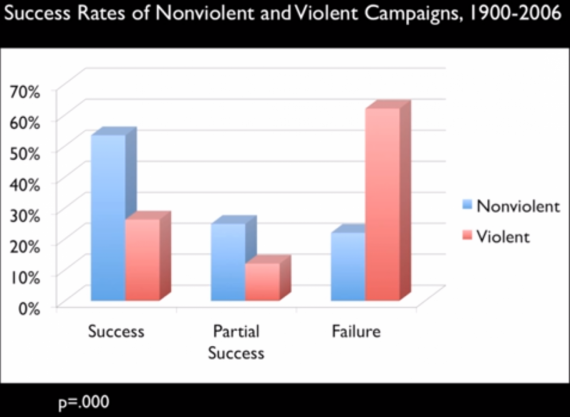
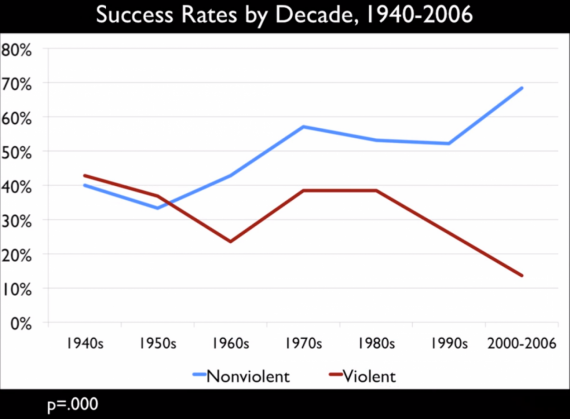

 Of course, it is true what Proverbs 27:6 says, that “Wounds from a friend can be trusted, but an enemy multiples kisses,” but this principle can often be reversed as well, in that friends often overlook our faults and failures because they love us (and maybe because they have the same issues), whereas enemies see through our self-righteous attitudes and hypocritical charades and are more willing to criticize and call us out for our many failures.
Of course, it is true what Proverbs 27:6 says, that “Wounds from a friend can be trusted, but an enemy multiples kisses,” but this principle can often be reversed as well, in that friends often overlook our faults and failures because they love us (and maybe because they have the same issues), whereas enemies see through our self-righteous attitudes and hypocritical charades and are more willing to criticize and call us out for our many failures.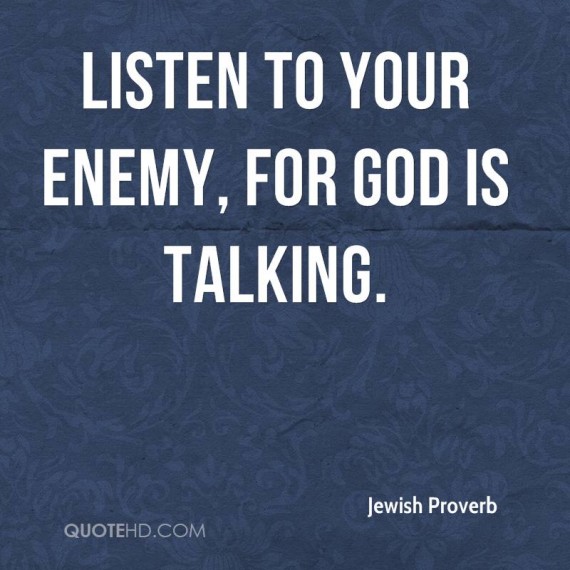

 I think all of us “Christians” should stop referring to ourselves as “Christians.”
I think all of us “Christians” should stop referring to ourselves as “Christians.”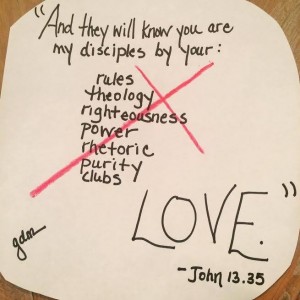 The Christians of Antioch were not known for their hate, venom, judgmentalism, or religious pride, or even for their good theology, pious life, and vast Bible knowledge. Instead, They were knowing for looking and acting and behaving like Jesus Christ, and as a result, they were “called Christians” by those who were not Christians.
The Christians of Antioch were not known for their hate, venom, judgmentalism, or religious pride, or even for their good theology, pious life, and vast Bible knowledge. Instead, They were knowing for looking and acting and behaving like Jesus Christ, and as a result, they were “called Christians” by those who were not Christians.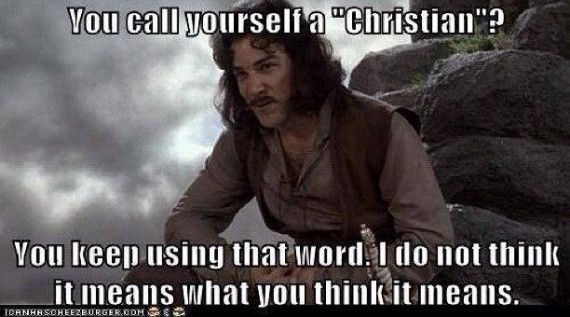
 I walked by two guys in the store the other day who were both wearing Christian t-shirts. One was saying to the other, “Yeah, they all hate me at work, but that’s okay, because I’m standing up for Christ.”
I walked by two guys in the store the other day who were both wearing Christian t-shirts. One was saying to the other, “Yeah, they all hate me at work, but that’s okay, because I’m standing up for Christ.” If love is of God, and everybody who loves is born of God and knows God because God is love (1 John 4:7-8), then it only makes sense that love will be the prevailing characteristic of one who is born of God and know God!
If love is of God, and everybody who loves is born of God and knows God because God is love (1 John 4:7-8), then it only makes sense that love will be the prevailing characteristic of one who is born of God and know God!
 It is common in Christian circles to hear admonitions to “Love the Sinner; hate the sin.”
It is common in Christian circles to hear admonitions to “Love the Sinner; hate the sin.” 
 The simple fact that we label the person we are talking about as a “sinner” indicates that we do not have love for them in the first place.
The simple fact that we label the person we are talking about as a “sinner” indicates that we do not have love for them in the first place.  When a watching world says Christians are full of hate, it is not a good strategy to tell them that we don’t hate them we just hate their sin.
When a watching world says Christians are full of hate, it is not a good strategy to tell them that we don’t hate them we just hate their sin. 

 When we say, “Love the sinner; hate the sin,” what we are really saying is “I will love only those I want to love, and I will hate and despise and cast out those people who do things I have decided are worse than the things I myself do, and this way I can make myself feel better while I condemn them for all the problems that I myself have contributed to but don’t want to admit.”
When we say, “Love the sinner; hate the sin,” what we are really saying is “I will love only those I want to love, and I will hate and despise and cast out those people who do things I have decided are worse than the things I myself do, and this way I can make myself feel better while I condemn them for all the problems that I myself have contributed to but don’t want to admit.”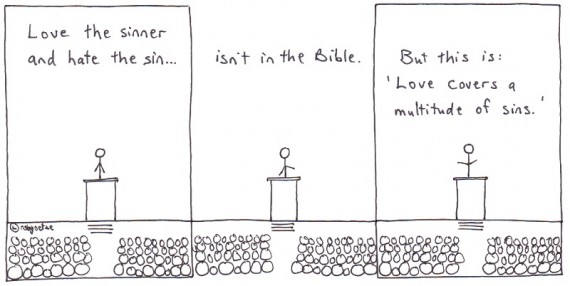
 And why can’t that be enough? When we see someone else behaving in ways we don’t approve of and which we think is sin (and as long as it’s not illegal or harming someone), why can’t “love” be the only word that comes to our mind?
And why can’t that be enough? When we see someone else behaving in ways we don’t approve of and which we think is sin (and as long as it’s not illegal or harming someone), why can’t “love” be the only word that comes to our mind? 
 I just didn’t think it would all happen so quickly… But I was wrong.
I just didn’t think it would all happen so quickly… But I was wrong.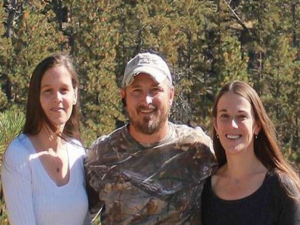 In the wake of the Supreme Court basically saying that two people can get married if they love each other, even if they are of the same sex,
In the wake of the Supreme Court basically saying that two people can get married if they love each other, even if they are of the same sex, 

 Furthermore, it has been said, “Whoever divorces his wife, let him give her a certificate of divorce.” But I say to you that it looks bad to divorce your wife, so stay married for appearance sake, while you sleep around as much as you want. If you can get your wife to agree to this, even better, for it’s not adultery if your wife knows what you’re doing.
Furthermore, it has been said, “Whoever divorces his wife, let him give her a certificate of divorce.” But I say to you that it looks bad to divorce your wife, so stay married for appearance sake, while you sleep around as much as you want. If you can get your wife to agree to this, even better, for it’s not adultery if your wife knows what you’re doing.


 Whatever. You’ll never see me again. You’ll never know my name. You’ll never know where I am or what I’m doing. But you should always be looking over your shoulder. Maybe that car door closing out front is the sheriff getting out of his car to come get you because I’ve decided to testify against you.
Whatever. You’ll never see me again. You’ll never know my name. You’ll never know where I am or what I’m doing. But you should always be looking over your shoulder. Maybe that car door closing out front is the sheriff getting out of his car to come get you because I’ve decided to testify against you.